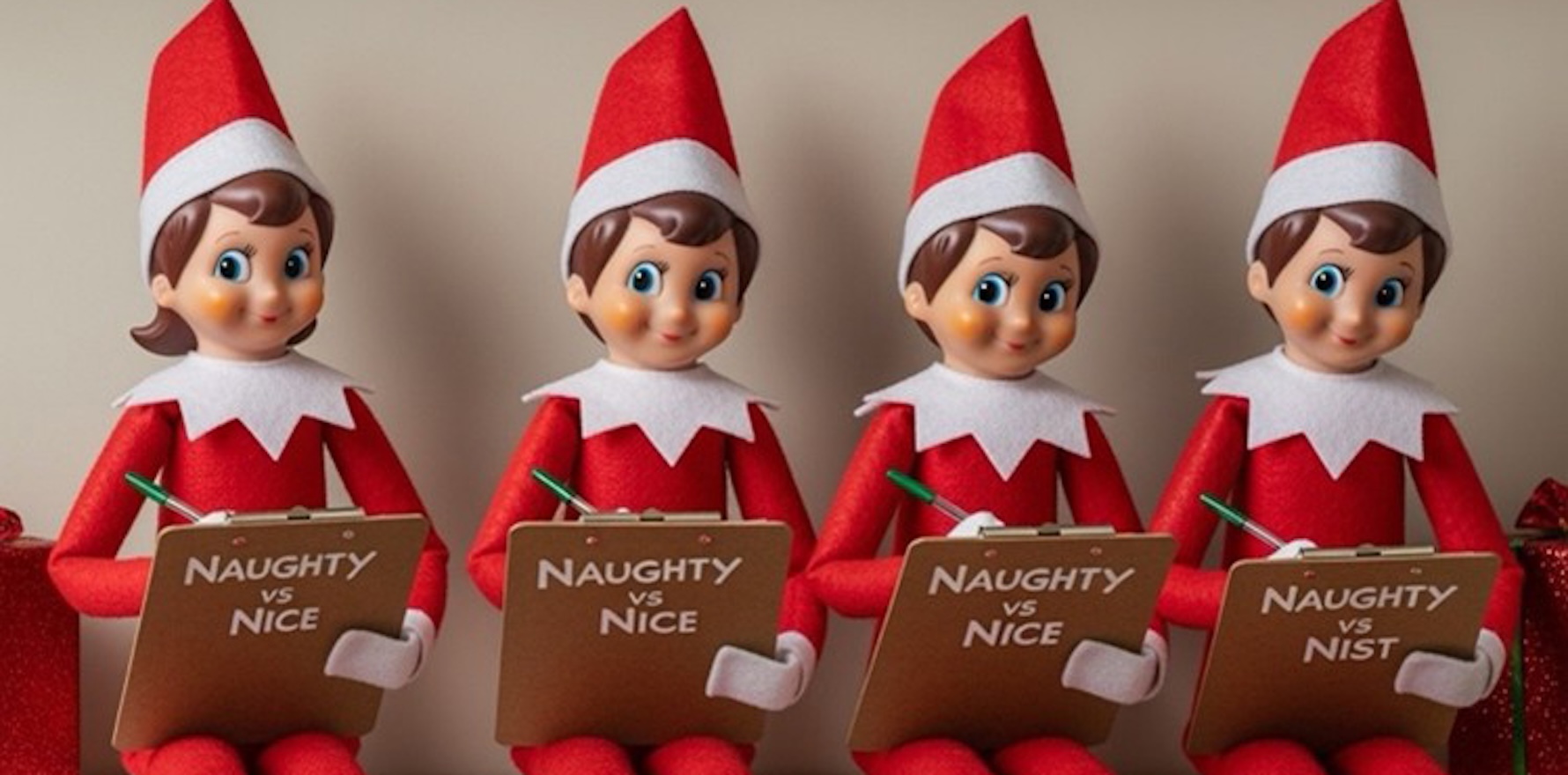The picture above may be generated by AI, but the Elves on the GP Shelves are as real as my feeling of impending retirement.
I am ambivalent about this whole Christmas surveillance thing.
I remember as a child being quite disturbed (and shouldn’t I have been?) by the idea that Santa “sees you when you’re sleeping” and “knows when you’re awake”.
Isn’t that a little bit, well, creepy?
And then came Elf on the Shelf. Thankfully, my kids were far too old for me to engage with this trend. For those who (thankfully) escaped the Elf on the Shelf idea, basically, the Elf is purchased (of course it is) along with all his paraphernalia (ka-ching) and watches the child over the lead-up to Christmas, reporting daily to Santa whether the child is engaging in “low-value behaviour”.
What could possibly go wrong with that??
I suspect surveillance isn’t particularly effective for the kid who is a long way down the naughty list. There are children waaaaaay beyond the threat of a lump of coal in the stocking.
The ones who burn down their local school, for instance, or roam the streets looking for trouble are unlikely to be reformed by Santa. It’s the generally good kids, the ones who can be manipulated with a bit of guilt and shame, who are excellent targets for an elf.
Guilt and shame are well-validated, evidence-based tools that have been utilised to good effect since the dawn of time.
Wasn’t it Foucault who said that the effect of early surveillance is that people internalise the principles and become their own surveyors, regulators and disciplinarians? It is an efficient way to control the masses. It’s just not particularly kind.
Understandably, people have criticised elves for teaching children that involuntary, non-consensual surveillance is normal.
Personally, I think a bit of surveillance is a good thing. If these kids become GPs, it will be less uncomfortable for them to tolerate the constant professional surveillance that is now part of our daily lives.
The four elves on the shelves of a GP consulting room
Every day that I consult, at least four invisible elves hover just behind my shoulder, distracting me with their invisible clipboards. I have given them names. It makes me feel more empowered, somehow.
- Judy Coinkeeper, the PSR elf
I have no problem with Judy counting what I bill. I do use public money, and so I have fiscal responsibilities after all.
What I object to is young Judy thinking she can look at my notes and work out how much I should have billed, without asking me. And I really would prefer she do her counting outside my consulting room.
We have a contract, my patient and I. They expect I will keep their information private, except in certain circumstances (like subpoenas, or if they are a risk to themselves or others). They did not know or consent to government oversight of the content of their consultation.
I do not like the idea of sending reams of notes to be perused by the PSR.
But Judy disagrees. She keeps making the scroll of rules longer and longer and longer, and when I can’t reconcile item 1,000,320 with item 3,459,903 she assumes I am deliberately defrauding the government.
After all, she knows every rule and her own interpretation is clearly the correct one. Any deviation obviously indicates evil intent, and deserves several lumps of coal.
- Maynard Thriftward the behavioural economics elf
Maynard is convinced that mathematics, economics, statistics and other forms of quantifiable data reveal truth.
Frankly, I feel a little sorry for him. After all, Santa has a history of being too subjective for his taste, and as for children, we all know they have characteristics that are difficult to quantify.
However, he is not lacking in either tenacity or a deep sense of self-importance and moral outrage, so he diligently records characteristics associated with poor paediatric behaviour and applies them across the board.
In general practice, he scrutinises things like back x-rays, opiate prescribing, and overseas travel, and works out the serial offenders.
There is a threshold for coal distribution and he applies it ruthlesslessly, no matter where the GP is, who the GP sees or why the GP uses the “low-value” care Maynard has clearly defined.
It seems obvious to him that if you stop the top 5% doing whatever it is they do, low-value care will diminish.
Because in the next round there will be a different top 5%, and eventually, the prescribing or ordering issues will trend towards zero which, in his mind, is the point.
It might be clinically outrageous, but at least it is fiscally responsible.
- Hippocrates Frostblade, the AHPRA elf
Ah Hippocrates. You do your best, don’t you? You started with a list of rules that was quite short, really, and focused on competence.
But now? Now the community expects a well-rested, patient-centred, collaborative leader with an enviable ability to read emotional cues while remaining objective and fulfilling prescribed CPD with a learning mindset and a humble heart.
There aren’t many who can live up to that vision, so you’re a bit busy.
Frankly, Santa is a bit overloaded by the number of people you report to headquarters. You are sending an endless stream of mild concerns to him for evaluation, and he is having trouble weeding out the one psychopath from the millions who had, frankly, a bit of a bad day.
We admire your vision, but it’s your optimism that’s the problem. At this rate, it’s only a matter of time before the cookies and milk Santa has to extract from the children outstrips the GDP.
- Nellie Inkwell, the public opinion elf and her media colleagues
This elf is particularly difficult to appease, because she is a chameleon.
She may deploy her clipboard for menopausal patient one because I did not supply her with her preferred hormonal therapies at the first consultation, but she may also work with the AHPRA elf and employ her regulatory power for patient number two because I didn’t treat menopause as the natural process it obviously is, when I tried to “sell” the patient hormones sourced from Big Pharma.
This elf is erratic and doesn’t seem to have a sense of proportion.
What is particularly annoying about young Nellie is that she seems to fundamentally disagree with the behavioural economist elf because she wants the patient to be satisfied, where Maynard the economist just wants the patient to be given the cheapest solution in the quickest time possible.
Nellie doesn’t think she asks much: she wants cheap, high-quality and endlessly available healthcare from an empathic GP who gives her anything she asks. Why is this so difficult?
It is only a matter of time before a social media post will emerge with Nellie claiming I dismissed the patient’s concerns and didn’t take her seriously.
Evicting the elves
Frankly, the cacophony of the clip-boarded elves arguing fiercely for their own point of view is drowning out my patient. They become a distracting undercurrent for many of my consultations.
This makes it less possible to get anything “right” (whatever that is) and dramatically increases my stress levels, while minimising my capacity to meet any of the elf objectives I’m required to follow.
Most of us GPs are motivated to do our best. There are easier ways to make a living as a doctor than trying to reconcile the judgy expectations of various organisations, arms of government, management systems and regulatory bodies, particularly as they seem to be breeding like rabbits.
Motivation is rarely the problem for most GPs. We actually want to do our best, and to care for our patients.
If motivation is not the problem, threat is not the answer.
Related
What’s more, the elf and coal budget is now so high, that there is little left for gifts for the good kids. There are so many elves employed in surveillance, Santa’s workshop is seriously understaffed, and the gift numbers are dropping precipitously. What will happen if the children decide the Santa economy is just a bit, well, pointless?
And I do wonder whether the patient is happy with this invisible choir influencing my behaviour. Did they consent to this surveillance? Do they want it? Is the benefit of detecting the few sociopaths (and there are a few) outweighed by losing good doctors who buckle under the regulatory pressure?
Do we detect the sociopath using these methods anyway?
If the “bad” doctors have no guilt and shame, an elf isn’t going to make much difference. After all, the lawyered-up narcissist billing Medicare for a lot of unnecessary and substandard work is known to all of us.
The problem isn’t detecting him. It’s finding a way to change his behaviour. And I suspect an elf won’t have much impact.
Personally, I would prefer to keep the confidentiality and privacy of a medical consultation intact. I know the thing that is valued most highly by the Elf Lords is my data, which is the gold extracted from my consultations without payment or acknowledgement.
But frankly, these elves are getting in the way and are bringing my retirement ever closer. I often think I’ll just take my lump of coal and get out from under Santa’s thumb.
So, I’m trying to take the shelves down so I can evict the bastards. Surely, there are more productive things they could do in Santa’s workshop?
Associate Professor Louise Stone is a working GP who researches the social foundations of medicine in the ANU Medical School. She tweets @GPswampwarrior.




